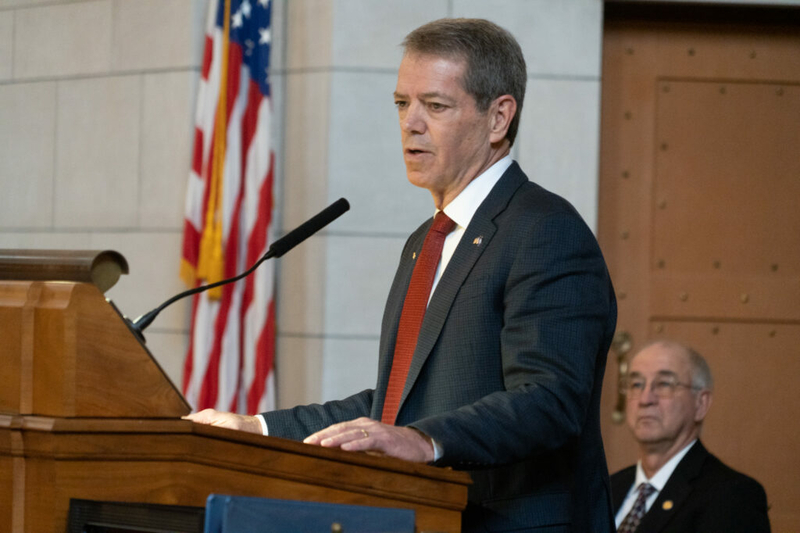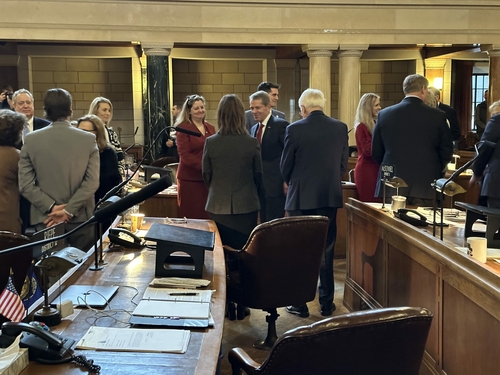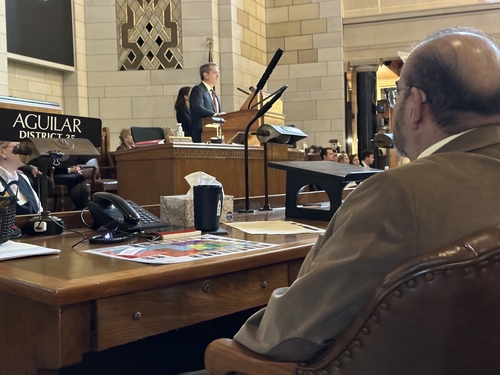Pillen touts his tax cut and education initiatives in State of the State speech

LINCOLN — New Gov. Jim Pillen plans to hold the line on state agency spending, while devoting the state’s massive revenue surplus for tax cuts, increased state aid to K-12 schools and building the Perkins County Canal.

The Republican governor’s budget only provides spending growth of 1.3% over the next two years — including only a .01% increase in the second year and a 2% funding boost for the University of Nebraska. That is less than the goal of 3% annual spending growth touted often by his predecessor, Pete Ricketts.
Pillen said people may have had a mistaken impression that he was going to give the university special treatment, but he won’t.
“We have asked agencies to tighten their belts and focus on what is needed, not what is nice,” Pillen told state lawmakers during his first “State of the State” speech Wednesday. He said he told several agencies, including the Nebraska Department of Agriculture, to eliminate open jobs or positions that they could not fill for a year or longer.
Pillen, a 67-year-old former member of the NU Board of Regents, mentioned again that he said “no” to a lot of new spending ideas, including new software beyond immediate needs at the Nebraska Department of Health and Human Services. His aim, he said, was to invest those funds in education and tax cuts that would reduce the state’s top income tax rate gradually from 6.84% to 3.99%.
“Our tax policy chases our kids and grandparents out of the state,” the governor said Wednesday. “We can’t grow Nebraska that way.”
His budget also includes setting aside $574 million to build the Perkins County Canal, a long-dormant project designed to collect and store water from the South Platte River for use during dry periods. The project was promoted last year by Pillen’s predecessor, Gov. Pete Ricketts.
The otherwise austere budget elsewhere is likely to get some pushback from state lawmakers who have proposed a bevy of their own spending proposals, including funds for a convention center in Lincoln, affordable housing and behavioral health initiatives and improvements to Fort Robinson State Park.
Pillen said after his speech that his proposal leaves senators plenty of money to spend, if they choose, more than $164 million each in 2023-24 and 2024-25. But he said senators would need to justify the spending and that he would have his veto pen ready.
Pillen absent at briefing
In a break from tradition, the governor did not attend a pre-State of the State briefing for reporters, held Tuesday afternoon with state budget officials. It was explained that Pillen’s schedule had changed due to the recent death of his mother-in-law.

But he had already announced a couple of his main objectives last week.
One was to devote $2.5 billion to increase state aid to K-12 schools, on a per-pupil basis, to schools not getting state aid now and to hike spending to educate special needs students.
Another was a package of tax cuts that would lower the state’s top income tax rate for individuals and corporations, decrease property taxes by giving another $300 million a year in property tax credits and shifting community colleges to a state, rather than a local property tax, obligation.
Pillen said taking community colleges off the tax rolls will be felt by property owners immediately and that he hoped the investment in community colleges would get more young people to consider more education and training after graduating high school.
On Wednesday, he said his proposal to phase out state taxes on Social Security would take effect in the 2024 tax year.
He and his budget director also clarified that his intent for the 3.99% tax is not for a “flat tax,” as the governor told reporters last week, but to reduce the top two brackets. Two current state income tax brackets that are below 3.99% for low-income Nebraska would remain the same. They said they expect the bill to be amended soon.
Abortion restrictions vs. rights
Pillen’s speech also discussed the need for state lawmakers to pass additional state restrictions on abortion. He clarified after his speech that he supports State Sen. Joni Albrecht’s Legislative Bill 626, which would essentially ban abortions at six weeks, and, in many cases, less, depending on when a woman becomes aware she is pregnant.
Pillen said in his speech that people should know that he and others who want more restrictions are not trying to limit access to contraception or in vitro fertilization. He said he and others are working to save “the babies in a mother’s womb.”
“I am fighting to help women choose life and love,” the governor said.
Nebraska Democratic Party chair Jane Kleeb said in a tweet that Pillen and other Republicans don’t seem to understand why young people are leaving the state.
It’s not about taxes, she said. It’s because the state wants to govern reproductive rights and personal decisions and “create a state where there is one ideology and one way of thinking,” Kleeb said.
Final funds for new prison
The governor’s budget would give final funding to replace the aging State Penitentiary in Lincoln, a $96 million allocation for a 1,500-bed prison now expected to cost $350 million in total. The exact location of the prison, to be located somewhere in the Omaha and Lincoln areas, was not revealed by his administration.

During the budget briefing Tuesday, Lee Will, the governor’s chief budget administrator, pushed back on early criticism that Pillen’s tax-cut plans were financially unsustainable and that the $1.9 billion revenue surplus would be quickly exhausted under his proposals.
Will said that even under the worst scenario — a recession that would decrease state tax receipts as in 2008-09 — the state would have a record $1.6 billion cash reserve to tap.
More infrastructure funds
Among his other budget priorities:
- Devote $100 million in state matching funds to obtain $400 million in federal funds from the infrastructure bill signed into law recently by President Joe Biden. Will said the funds would likely be used for things like “shovel ready” highway construction projects.
- Devote $39.4 million to 4,200 higher education “career” scholarships, targeted at high-need fields like nursing and education where job vacancies are a problem. “We need more engineers, actuaries, accountants, architects, geneticists, scientists, nurses, and teachers,” Pillen said Wednesday. “We need more welders, auto technicians, electricians, and technicians to fix computing dependencies on cars, trucks, tractors and combines – almost everything.”
- Fund salary increases for state workers, which includes a 22% increase for state troopers and raises ranging from 10% to 27% for other state workers. The raises are designed to address workforce shortages among snow plow drivers and health aides. Similar raises, Will noted, have helped fill vacant posts at state prisons in recent months.
- Spend $10 million for retention grants for teachers, nurses, veterinarians and other health professionals.
- Reserve $25 million in tax credits for donations to “opportunity scholarships” for kids attending private schools. It has been portrayed as a means of giving kids another choice in K-12 education, but some critics have decried it as a way to devote public funds for private schools.
- Provide $10 million to hire mentors to help improve reading among schoolchildren in grades 1 through 4.








